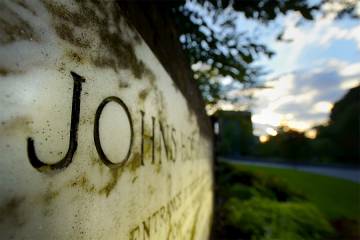Maryland senators voted Friday to approve the nominations of 13 community members, students, faculty, and staff to the Johns Hopkins University Police Accountability Board, which will help directly shape the development and operation of the future Johns Hopkins Police Department.
The board members won unanimous support from the Senate Executive Nominations Committee earlier this week in Annapolis, and their appointments were confirmed Friday by the full Senate.
At Monday's committee hearing, several future accountability board members spoke about why they decided to apply to the board and about the important role they hope to play.
"I look forward to the work, to listen and learn, and to build a bridge between the community and Johns Hopkins University and Medicine," said Sonja Merchant Jones, chair of the board of directors of the Better Waverly Community Organization and one of three community members nominated to the police accountability board.
Jed McCormick, a Baltimore native and one of three JHU staff members on the board, attended the hearing with his two young sons.
"More likely than not, the people to encounter the police here will look like me and my sons," McCormick said, "and so I think it's important that I be part of the process of determining the policing procedures and holding the police accountable."
Edward Kangathe, an East Baltimore community member, brought his son as well, a first-grade student at Henderson-Hopkins, hoping to show him a glimpse of democracy in action.
Lorraine Dean, an assistant professor in the Department of Epidemiology at the Johns Hopkins Bloomberg School of Public Health, said she opposed the creation of the police department but believed she could use her position on the board and her background as a researcher to advocate for "using the evidence base to help guide the committee's decisions.
"At the very least, I feel like I can contribute to creating something truly unique, … that's truly community-oriented, and that truly protects the health and safety of everyone, not just the Hopkins few at the expense of everyone else," Dean said.
Other board appointees said they were proponents of the police department, including Pritika Parmar, a sophomore majoring in neuroscience and public health studies.
"I'm here to advocate for all those students whose voices don't seem to be the loudest ones in the room but are still there," said Parmar, who serves as executive secretary for JHU's Student Government Association.
Drawn from East Baltimore, Homewood, and Peabody—the three campuses and surrounding communities—the nominees include three community members, three faculty members, three staff members, and four students. There will be two additional appointments made by Baltimore's mayor and the Baltimore City Council president for a total of 15 accountability board members.
Non-student accountability board members will serve for two years, while student members will serve for one year and must be enrolled for the duration of their term. The accountability board will share community feedback with department leadership, review the police department's metrics involving crime, and assess policies, procedures, and training in order to provide recommendations for improvement. The accountability board will also serve as a mechanism for transparency.
The nominees chosen by Johns Hopkins from a group of 121 applicants are:
Community members
- Edward Kangethe, East Baltimore
- Sonja Merchant Jones, Homewood
- Noah Patton, Peabody
Faculty
- Lorraine T. Dean, ScD, Assistant Professor, Department of Epidemiology, Bloomberg School of Public Health
- Pier M. Larson, PhD, Professor, Department of History, Krieger School of Arts and Sciences
- P. Logan Weygandt, MD, MPH, Assistant Professor, Department of Emergency Medicine, School of Medicine
Staff
- Regina Gail Malloy, Executive Assistant to the President, Johns Hopkins Hospital
- Jed McCormick, Director of Finance and Administration, Johns Hopkins University
- Alexander McLin, Senior Programmer Analyst, Krieger School of Arts and Sciences
Students (undergraduate, graduate, medical resident, post-doc, and fellow)
- Shanice Guthrie, Undergraduate, Krieger School of Arts and Sciences
- Katie J. O'Conor, MD, Physician, Departments of Emergency Medicine and Anesthesiology and Critical Care Medicine; Fellow, School of Medicine
- Pritika Parmar, Undergraduate, Krieger School of Arts and Sciences
- Kwame Romero-Sackey, Graduate Student, School of Medicine
Forming the accountability board is the first step the university is taking in the multi-year planning and implementation of the JHPD, which was authorized by the Maryland legislature during last year's session. The nominees represent a wide array of perspectives, including some who have expressed opposition to the formation of the JHPD and want to help ensure the law is followed closely.
Additional steps in the development of the JHPD are awaiting the completion of the ongoing search for a new vice president for security. Once that person is in place, the university will begin discussions with the Baltimore Police Department on a memorandum of understanding, which will be subject to public feedback.
More information about the accountability board can be found on the Public Safety Initiatives website, which includes a form for ideas and feedback.
Posted in University News
Tagged campus safety and security











